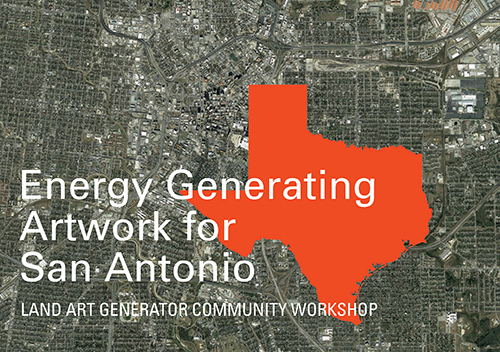Land Art Generator Community Workshop
San Antonio, Texas
On April 6, 2017, the Local Initiatives Support Corporation (LISC) hosted the Land Art Generator Initiative for a workshop in San Antonio in partnership with the Land Heritage Institute, LiftFund, and AIA San Antonio.

During the day long workshop, community members investigated how renewable energy technologies can be incorporated into public art and creative placemaking opportunities around San Antonio. The event was an open forum for the exchange of ideas within a variety of contexts to address multifaceted issues around the environment and social equity through a design lens, and without constraints on individual creativity.
Over the next decade as San Antonio continues to build on its rich cultural heritage through exciting developments around the city, it will be important to maintain a focus on how the outcomes of economic growth will bring benefits to everyone and not only to those who live in more affluent districts. It will also be important to consider the environment and incorporate sustainable infrastructures for energy, water, and food.
Perhaps there are opportunities to bring site specific design solutions to key sites around San Antonio that can proactively address these issues and serve as an example and catalyst for equitable development throughout the region.
This is the challenge that the participants in the workshop set out to solve with artful and creative proposals for speculative design interventions in public space.
The discussion brought out many ideas for potential applications in San Antonio, including vacant lots, the Mission Reach, and major development projects where a public art component could also add to sustainable development goals by generating clean energy on site.
Conversation pointed to how such projects could involve the school systems to invigorate science, technology, engineering, and math education by inspiring creativity and supporting STEM to STEAM initiatives. Sites could serve as destination field trips for learning about closed-loop systems, sustainable technologies, ecology, and biomimicry.